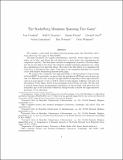| dc.contributor.author | Cardinal, Jean | |
| dc.contributor.author | Demaine, Erik D | |
| dc.contributor.author | Fiorini, Samuel | |
| dc.contributor.author | Joret, Gwenaël | |
| dc.contributor.author | Langerman, Stefan | |
| dc.contributor.author | Newman, Ilan | |
| dc.contributor.author | Weimann, Oren | |
| dc.date.accessioned | 2019-06-19T14:06:57Z | |
| dc.date.available | 2019-06-19T14:06:57Z | |
| dc.date.issued | 2009-03 | |
| dc.date.submitted | 2008-07 | |
| dc.identifier.isbn | 978-3-540-73951-7 | |
| dc.identifier.uri | https://hdl.handle.net/1721.1/121355 | |
| dc.description.abstract | We consider a one-round two-player network pricing game, the Stackelberg Minimum Spanning Tree game or StackMST. The game is played on a graph (representing a network), whose edges are colored either red or blue, and where the red edges have a given fixed cost (representing the competitor's prices). The first player chooses an assignment of prices to the blue edges, and the second player then buys the cheapest possible minimum spanning tree, using any combination of red and blue edges. The goal of the first player is to maximize the total price of purchased blue edges. This game is the minimum spanning tree analog of the well-studied Stackelberg shortest-path game. We analyze the complexity and approximability of the first player's best strategy in StackMST. In particular, we prove that the problem is APX-hard even if there are only two different red costs, and give an approximation algorithm whose approximation ratio is at most min {k,1+ln b,1+ln W}, where k is the number of distinct red costs, b is the number of blue edges, and W is the maximum ratio between red costs. We also give a natural integer linear programming formulation of the problem, and show that the integrality gap of the fractional relaxation asymptotically matches the approximation guarantee of our algorithm. | en_US |
| dc.description.sponsorship | Communauté française de Belgique. Actions de Recherche Concertées (ARC) fund | en_US |
| dc.language.iso | en | |
| dc.publisher | Springer Nature America, Inc | en_US |
| dc.relation.isversionof | 10.1007/s00453-009-9299-y | en_US |
| dc.rights | Creative Commons Attribution-Noncommercial-Share Alike | en_US |
| dc.rights.uri | http://creativecommons.org/licenses/by-nc-sa/4.0/ | en_US |
| dc.source | MIT web domain | en_US |
| dc.title | The Stackelberg Minimum Spanning Tree Game | en_US |
| dc.type | Article | en_US |
| dc.identifier.citation | Jean Cardinal, Erik D. Demaine, Samuel Fiorini, Gwemael Joret, Stefan Langerman, Ilan Newman, and Oren Weimann. "The stackelberg minimum spanning tree game." Proc. 10th international Workshop on Algorithms and Data Structures (WADS), Lecture Notes in Computer Science, volume 4619 (2007): 64–76. | en_US |
| dc.contributor.department | Massachusetts Institute of Technology. Department of Electrical Engineering and Computer Science | en_US |
| dc.relation.journal | Lecture Notes in Computer Science | en_US |
| dc.eprint.version | Author's final manuscript | en_US |
| dc.type.uri | http://purl.org/eprint/type/JournalArticle | en_US |
| eprint.status | http://purl.org/eprint/status/PeerReviewed | en_US |
| dc.date.updated | 2019-06-19T10:58:18Z | |
| dspace.date.submission | 2019-06-19T10:58:22Z | |
| mit.journal.volume | Vol. 4619 | en_US |
